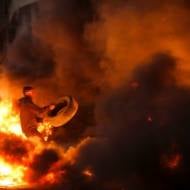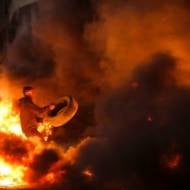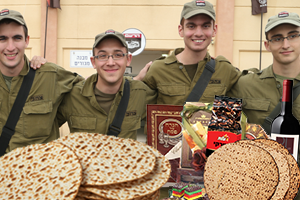
Assault on Joseph’s Tomb Shows Why Only Israel can Protect Holy Sites

The Palestinian Authority cannot be relied on to protect Joseph’s Tomb in Nablus.
By Alan Baker, Jerusalem Center for Public Affairs via JNS.org
On the night of April 9, 2022, dozens of Palestinian rioters in Nablus (Shechem) vandalized the Jewish holy site known as the Tomb of Joseph. The rioters set fire to the site, smashed the cenotaph above the grave, smashed electrical lighting, burned prayer books and ruined and burned equipment within the tomb area.
The next day, the rioters returned to destroy whatever they had missed during the previous night.
Similar attacks have taken place at the site in the past.
In 2000 rioting, an Israeli policeman, Madhat Yussef, was shot and bled to death over the hours the Palestinian Authority denied entry to Israeli medical personnel. In 2015, the site was again seriously damaged by arson committed by Palestinian rioters.
Religious Significance
Since Nablus is located within the Palestinian-populated Area A, as defined in the Israeli-Palestinian Interim Agreement (1995), commonly known as “Oslo 2,” it is under the full control and jurisdiction of the Palestinian Authority.
The holiness of Joseph’s Tomb stems from the reference in Book of Joshua, chapter 24, verse 32:
“And Joseph’s bones, which the Israelites had brought up from Egypt, were buried at Shechem in the tract of land that Jacob bought for a hundred pieces of silver from the sons of Hamor, the father of Shechem. This became the inheritance of Joseph’s descendants.”
Historical and biblical references to the Tomb, including pilgrim accounts and scholarship, confirm its location in the Nablus area.
In light of the religious importance and sensitivity of holy sites, to both Palestinians and Israelis, whether these be tombs, graves, places of worship or other related holy places, they are all revered and respected and enjoy protected status by the parties.
Legal status and obligations
The status of Joseph’s Tomb and the responsibility of the Palestinian Authority to protect it and those visiting it was agreed upon in the 1995 Interim Agreement, which specifically lists the Tomb as a Jewish holy site in its fourth appendix, together with the Shalom Al Israel Synagogue in Jericho.
In the Protocol attached as Annex I to the Interim Agreement, concerning “Redeployment and Security Arrangements,” Article V, paragraph 2 provides that “the protection of [Jewish holy sites], as well as of persons visiting them, will be under the responsibility of the Palestinian Police.”
This overall Palestinian responsibility is, according to the agreement, to be maintained and supervised by “Joint Mobile Units” composed of vehicles driven by Palestinian police and by Israeli security forces, whose task, according to the same article, is to provide rapid response in the event of incidents and emergency situations, and to:
1. Ensure free, unimpeded, and secure access to the relevant Jewish holy site;
2. Ensure the peaceful use of such sites, to prevent any potential instances of disorder and to respond to any incident.
The agreement also provides, in subparagraph (c) of Article V (2), that “Given their Jewish religious nature, plainclothes Israeli guards may be present inside such sites.”
It appears that since 2000, following the murder of Israeli policeman Madhat Yussef, the provisions of the Interim Agreement regarding Joint Mobile Units and rapid response to incidents and emergency situations have not been implemented.
However, specific periodic visits to the Tomb are coordinated between the respective security authorities as part of the security cooperation between them, with a view to ensuring safety and prevention of violent incidents.
Given the acute sensitivity of all religious sites to both Palestinians and Israelis, and in light of the unique religious significance of the current period, during which the Muslim holy month of Ramadan, the Jewish festival of Passover and the Christian festival of Easter all occur together, it is all the more incumbent upon the Palestinian leadership to fulfill their responsibilities as agreed in the Oslo Accords, to prevent such vandalizing and desecration of a Jewish or any holy site under their authority.
The repeated assaults on religious sites, which the P.A. is supposed to prevent, strongly suggests that the responsibility for protecting them must remain with Israel and not be turned over to a Palestinian governmental body which cannot be relied upon, as has been proven on repeated occasions.
Ambassador Alan Baker is director of the Institute for Contemporary Affairs at the Jerusalem Center and the head of the Global Law Forum. He participated in the negotiation and drafting of the Oslo Accords with the Palestinians, as well as agreements and peace treaties with Egypt, Jordan and Lebanon.
Send Passover Packages to Needy Israeli Soldiers – Bring Them Joy!
We are honored to thank the young men and women of the IDF who risk their lives every day to protect the freedom of the citizens of Israel.
Join us in sending Passover food packages (and personal notes) to Israeli soldiers and their families
Many soldiers spend the Passover holiday with needy families back home. The soldiers greatly appreciate your love and concern. Bring them Passover joy!
CLICK HERE TO SEND YOUR PACKAGE AND NOTE TO ISRAELI SOLDIERS!
The post Assault on Joseph’s Tomb Shows Why Only Israel can Protect Holy Sites first appeared on United with Israel.
United with Israel
